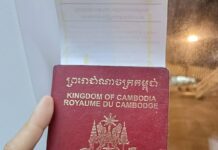Cambodia, which aspires to middle-income status by 2030, must do more to tackle corruption. While it has many tools at its disposal, asset declaration has proven an effective instrument at improving public-sector transparency.
What is asset declaration?
Asset declaration is a global best practice for fighting corruption that requires government officials to declare their wealth, including bank accounts, homes, cars and business. These declarations offer a public view into bureaucrat’s wealth, and they have proven an effective way for enhancing public-sector transparency and accountability and preventing corruption.
The public declaration of assets allows the public to track officials’ wealth over time. Moreover, it is a boundary to limit dishonest practices in the public sector.
Cambodia requires a broad range of government employees to declare assets, including national assembly members, civil servants, police officers, and members of the judiciary. Regulations require them to declare assets and debt, including businesses, properties and sources of income. There are penalties for failing to submit declaration forms, including fines and jail.
Family members, however, are not required to submit declarations, which offers loopholes that experts say can be abused.
The effects of corruption are many, according to unodc.org, and cause numerous social and economic problems like increasing poverty, inequality, discrimination and crime; slowing social and economic development; lowering public participation in society; and reducing faith in government and public institutions.
Cambodia in 2021 received a score of 23 out of 100 points on the Transparency International Corruption Perception Index, ranking it 157 of 180 countries.
Cambodia’s high perception of corruption hurts investment and economic growth. Do investors want to put their money into a corrupt state? Payment of small and informal fees are often required to carry out typical business requests, like filing official paperwork, registering for state licenses or clearing customs. Corruption favors the wealthy, who can more easily afford to pay bribes, and discourages small business owners and investors. An uneven playing field slows economic development by allowing inefficient business to thrive while hurting small players who struggle to pay informal fees.
Because the declaration of assets and liabilities is important in fighting corruption, we should work to promote this law and its benefits, especially to the younger generation. This will help ensure that future leaders understand the importance of fighting corruption, and help the country reach its goal of middle-income status.
As a youth of Cambodia, I promise to spread this idea.









